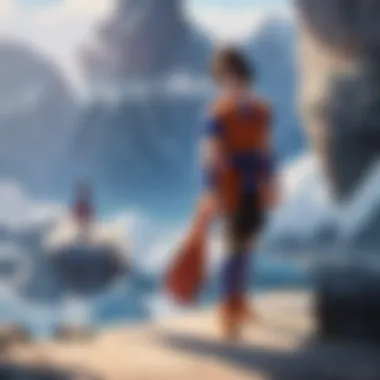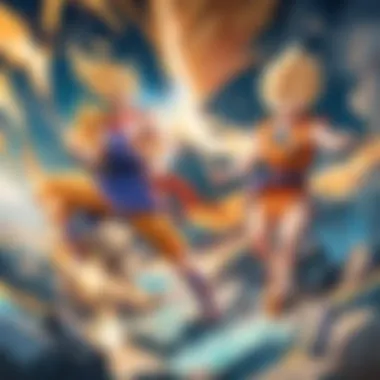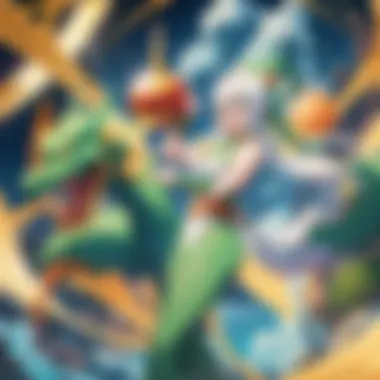Dragon Ball Z vs. Dragon Ball - A Detailed Comparative Analysis of Two Anime Legends


Episode Reviews
Dragon Ball Z and Dragon Ball stand as iconic pillars within the anime realm, captivating audiences with their rich characters, intricate storylines, and profound themes. In this comparative analysis, we delve into the heart of each episode, dissecting key events, unraveling the depths of character development, and reminiscing on truly memorable moments that have ingrained themselves in the annals of anime history.
Character Spotlights
Embark on a journey through the vibrant tapestry of characters woven within the Dragon Ball universe. Unravel the enigmatic backgrounds, distinctive personality traits, and unique quirks that define each character. Explore their pivotal roles in the grand tapestry of the storyline, while delving into fan theories and speculations that add layers of intrigue to these beloved figures.
Anime vs. Manga Comparison
Dive headfirst into the captivating realm that juxtaposes the animated splendor of the anime with the intricate artistry of the manga. Unearth the plot disparities that breathe life into alternate dimensions of these beloved tales. Delve into discussions on the quality of art and animation, scrutinize character portrayals, and navigate the turbulent tides of fan preferences and opinions that shape the very essence of the Dragon Ball franchise.
Industry News and Updates
Stay ahead of the curve with the latest breaking news and tantalizing insights on upcoming releases within the anime world. Immerse yourself in meticulous analyses of industry trends that herald paradigm shifts and revolutionary developments. Gain valuable insight into the intricate machinations of the production process, unraveling the mystique that surrounds the creation of these timeless masterpieces.
Top Lists
Uncover a world of intrigue and fervor as we unveil the definitive rankings of favorite characters and episodes that have left an indelible mark on the collective consciousness. Immerse yourself in the exhilarating compilation of the best fight scenes that epitomize the essence of passion and grit within the anime genre. Engage in a comparative analysis of the myriad genres that populate the anime and manga landscape, fueled by audience polls and feedback that amplify the vibrant kaleidoscope of perspectives that animate the world of Dragon Ball.
Introduction
In the realm of anime and manga, the discourse surrounding Dragon Ball Z versus Dragon Ball holds significant importance, sparking engrossing debates among enthusiasts. This article embarks on a meticulous journey of comparison between these two iconic series, dissecting their intricate layers of characters, storylines, and themes. By navigating through the evolution and legacy of both Dragon Ball Z and Dragon Ball, a profound understanding of their distinctiveness emerges, painting a vivid picture of their cultural impact within the anime domain.
Brief Overview of Dragon Ball Z and Dragon Ball
Origins and Creation
The genesis of Dragon Ball Z and Dragon Ball unveils a captivating tale of innovation and creativity in the realm of anime. Originating from the visionary mind of Akira Toriyama, each series embodies a unique genesis that sets the tone for their unparalleled narrative depth. Toriyama's adeptness in world-building and character construction infiltrates every frame, laying the foundation for the rich tapestry of events that unfold. The distinct nature of their creation significantly influences the overarching themes and character dynamics, enriching the viewer's experience by adding layers of complexity and intrigue.
Main Characters
Central to the allure of both Dragon Ball Z and Dragon Ball are their protagonist ensembles, led by the indomitable Goku and his cohorts. These characters serve as pillars of strength and vulnerability, embarking on transformative journeys that resonate with audiences worldwide. The depth of their portrayal and interpersonal relationships adds a dynamic layer to the series, ensuring a multi-dimensional viewing experience. Through the lens of the main characters, the ethos and heartbeat of each saga reverberate, delivering powerful messages of resilience, friendship, and growth.
Cultural Significance


Impact on Pop Culture
The impact of Dragon Ball Z and Dragon Ball on popular culture remains an indelible facet of their legacy. From iconic battle sequences to poignant character moments, each series has left an enduring imprint on the cultural zeitgeist, transcending generational boundaries. Their influence extends beyond conventional entertainment, seeping into fashion, music, and even societal discourse. By weaving together elements of heroism, hubris, and humanity, Dragon Ball Z and Dragon Ball have solidified their positions as cultural touchstones, revered for their ability to resonate with diverse audiences.
Global Fanbase
The global fanbase of Dragon Ball Z and Dragon Ball stands as a testament to the universality of their themes and messages. Spanning continents and cultures, this fervent community of enthusiasts showcases the transcendent power of anime in forging connections across borders. The collective passion and dedication of fans further amplify the significance of these series, fostering a sense of camaraderie and shared excitement. As ambassadors of the Dragon Ball universe, the global fanbase fuels the longevity and relevance of these seminal works, ensuring their place in the annals of anime history.
Storylines and Themes
In this section, we will delve into the crucial aspects of the storylines and themes of Dragon Ball Z and Dragon Ball. Understanding the narrative arcs is pivotal in comprehending the depth and complexity of these iconic anime series. The storylines serve as the backbone of the shows, setting the stage for character development and thematic exploration. By analyzing the progression of events and the underlying messages woven into the narratives, we can gain a profound insight into the creative genius behind Dragon Ball Z and Dragon Ball.
Narrative Arcs
Major Sagas
The Major Sagas in both Dragon Ball Z and Dragon Ball are monumental, shaping the trajectory of the plot and character evolution. Each saga introduces new challenges, adversaries, and growth opportunities for the protagonists, driving the story forward with intensity and excitement. The Major Sagas act as climactic peaks within the series, marking significant turning points that captivate audiences and leave a lasting impact. Their ability to maintain suspense, introduce fresh story arcs, and conclude with satisfying resolutions makes them essential components in engaging the viewers and sustaining interest throughout the shows.
Character Development
Character development plays a vital role in enhancing the depth and relatability of the protagonists and antagonists in Dragon Ball Z and Dragon Ball. Through the exploration of their backgrounds, motivations, and personal growth, viewers witness a dynamic transformation that adds layers to the narrative. The evolution of characters over time, their struggles, triumphs, and internal conflicts contribute to a multi-dimensional portrayal that resonates with the audience. Character development not only enriches the storytelling experience but also fosters emotional connections between the viewers and the characters, fostering empathy and investment in their journeys.
Key Themes
In addition to the narrative arcs, the key themes presented in Dragon Ball Z and Dragon Ball are instrumental in conveying essential messages and moral lessons. These themes serve as guiding principles that underscore the actions of the characters and the overall tone of the series. By examining the central themes of friendship and teamwork, as well as power and strength, we gain an understanding of the core values promoted by the shows and the significance of these concepts in shaping character interactions and plot dynamics.
Friendship and Teamwork
Friendship and teamwork are recurring motifs in both Dragon Ball Z and Dragon Ball, highlighting the intrinsic value of camaraderie and collaboration. The themes emphasize the power of unity in overcoming challenges, fostering bonds that transcend individual strengths and weaknesses. Through the portrayal of friendships forged in the heat of battle and the unwavering support shared among allies, the shows celebrate the importance of loyalty, trust, and mutual respect among characters. Friendship and teamwork serve as inspirational pillars that instill a sense of unity and purpose, resonating with viewers on a profound emotional level.
Power and Strength
Power and strength are central themes that underpin the action-packed sequences and intense confrontations in Dragon Ball Z and Dragon Ball. The concept of power signifies not only physical prowess but also inner determination, willpower, and resilience in the face of adversity. Strength, both in combat abilities and moral convictions, defines the characters' identities and shapes their destinies. As characters strive to surpass their limits, unlock hidden potential, and confront formidable foes, the themes of power and strength drive the narrative towards climactic showdowns and transformative moments. The exploration of these themes adds depth to the character dynamics and philosophical underpinnings of the series, challenging viewers to contemplate the true meaning of strength and the balance between power and responsibility.
Character Analysis


In this section of the article, we delve into the crucial aspect of character analysis within the realm of anime, specifically focusing on the iconic series Dragon Ball Z and Dragon Ball. Understanding the characters in these series is paramount as they drive the narrative, convey themes, and resonate with the audience. By examining the protagonists, antagonists, and supporting cast, we unravel the complexities of their personalities, motivations, and growth throughout the storylines.
Protagonists vs. Antagonists
Goku vs. Vegeta
When comparing Goku and Vegeta, we uncover a compelling dynamic that encapsulates the essence of conflict and growth in Dragon Ball. Goku embodies the archetypal hero, driven by a relentless pursuit of strength to protect his loved ones and the universe. In contrast, Vegeta, initially introduced as a ruthless antagonist, undergoes significant character development, transitioning into a complex anti-hero with shades of redemption. Their rivalry showcases contrasting philosophies on power, morality, and personal growth, enriching the narrative with depth and tension.
Frieza vs. Cell
The confrontation between Frieza and Cell underscores the thematic exploration of power and evolution within the Dragon Ball universe. Frieza, a tyrannical overlord consumed by his thirst for control, symbolizes the dangers of unchecked ambition and ego. On the other hand, Cell, a bio-engineered perfectionist, represents the relentless pursuit of strength and efficiency at any cost. Their battles not only test the limits of physical prowess but also delve into the complexities of identity, purpose, and the consequences of unchecked power.
Supporting Characters
Krillin, Piccolo, and Gohan
Examining the roles of Krillin, Piccolo, and Gohan sheds light on the significance of support systems and growth opportunities for the main characters in Dragon Ball Z and Dragon Ball. Krillin, as Goku's loyal friend, exemplifies courage and determination in the face of overwhelming odds. Piccolo, initially a nemesis turned mentor, provides wisdom and guidance rooted in his tumultuous past. Gohan, Goku's son, represents the promising future and inheritor of his father's legacy, navigating the pressures of balancing power with compassion. Together, these supporting characters enhance the narrative depth, offer unique perspectives, and contribute to the overarching themes of friendship, perseverance, and legacy within the franchise.
Art Style and Animation
Art style and animation play a pivotal role in distinguishing between Dragon Ball Z and Dragon Ball. The evolution of animation techniques across both series showcases a blend of traditional and modern approaches. In Dragon Ball, created by Akira Toriyama, the art style leans towards a more lighthearted and colorful aesthetic, capturing the adventurous spirit of the narrative. The character designs in Dragon Ball feature distinct traits that set them apart, emphasizing individuality and charm. On the other hand, Dragon Ball Z, known for its intense battles and power-ups, adopts a more dynamic and bold animation style to heighten the impact of confrontations between characters. The evolution of animation in both series reflects advancements in technology and storytelling within the anime genre, catering to diverse viewer preferences and expectations.
Evolution of Animation
Character Designs
Character designs in Dragon Ball and Dragon Ball Z play a crucial role in defining the characters and their personalities. In Dragon Ball, characters like Goku, Bulma, and Krillin are designed with simplicity yet convey a sense of innocence and purity, reflecting the initial tone of the series. The iconic spiky hair of Super Saiyan forms in Dragon Ball Z signifies power and transformation, becoming a symbol of strength and determination. The evolution of character designs from Dragon Ball to Dragon Ball Z illustrates a shift towards more detailed and muscular physiques, aligning with the escalation of battles and challenges faced by the characters. The consistency in character designs throughout both series ensures a cohesive visual identity, resonating with long-time fans and newcomers alike.
Fight Sequences
Fight sequences in Dragon Ball Z elevate the intensity of battles through strategic choreography and power-packed maneuvers. The iconic energy beams, rapid movements, and epic clashes between characters captivate audiences and emphasize the high-stakes nature of conflicts in the series. Each fight sequence is meticulously crafted to highlight the unique abilities and fighting styles of characters, creating engaging and adrenaline-pumping moments for viewers. In contrast, Dragon Ball focuses more on martial arts techniques and playful combat interactions, infusing humor and creativity into the fights. The evolution of fight sequences in Dragon Ball Z showcases the growth and development of animation techniques in anime, setting new standards for action-packed storytelling and visual spectacle.
Visual Aesthetics
Color Palette


The color palette used in Dragon Ball and Dragon Ball Z plays a significant role in shaping the mood and atmosphere of the narrative. In Dragon Ball, vibrant and warm colors dominate the landscapes and character designs, enhancing the whimsical and adventurous tone of the series. The use of bright tones symbolizes hope, friendship, and positivity, aligning with the underlying themes of camaraderie and perseverance. Conversely, Dragon Ball Z incorporates a wider range of colors, including bold shades of red, blue, and green to signify power levels and energy concentrations during intense battles. The shifting color palette reflects the escalating conflicts and emotional intensity experienced by the characters, drawing viewers into a visually immersive and captivating world.
Background Detailing
Background detailing in Dragon Ball Z plays a crucial role in establishing immersive settings and enriching the visual narrative of the series. The intricate detailing of landscapes, cities, and battle arenas adds depth and dimension to the environments where characters interact and engage in combat. From rocky terrains to futuristic cityscapes, each background is meticulously designed to enhance the storytelling and amplify the impact of pivotal moments within the plot. The attention to detail in background elements such as rubble, debris, and energy effects elevates the overall visual experience for viewers, creating a sense of realism and scale in the fantastical world of Dragon Ball Z.
Fan Reception and Legacy
Fan reception and legacy play a crucial role in shaping the impact of both Dragon Ball Z and Dragon Ball. The fandom surrounding these series is vast and devoted, with fans from around the world expressing their admiration through various means, such as fan art, conventions, and online communities. The legacy of Dragon Ball Z and Dragon Ball extends beyond the screen, influencing subsequent anime and manga creators in terms of storytelling, character development, and visual style. Understanding fan reception and legacy provides valuable insights into the lasting popularity and cultural significance of these iconic series.
Fan Theories and Speculation
Power Levels
The concept of power levels in Dragon Ball Z sparked numerous theories and speculations within the fan base. Power levels serve as a quantifiable measurement of a character's strength, fostering debates and discussions on forums and social media platforms. Fans delve deep into analyzing power scaling, comparing different characters' abilities and potential power-ups. The element of power levels adds a layer of complexity to character dynamics and battles, driving interest and engagement among viewers.
Future Arcs
Future arcs in Dragon Ball Z and Dragon Ball generated anticipation and speculation among fans. The prospect of new storylines, characters, and challenges captivated audiences, leading to fan theories regarding potential plot developments and character arcs. Future arcs injected fresh energy into the series, keeping fans invested and excited for upcoming episodes. These arcs also allowed for creative speculation on the direction of the narratives, fueling fan conversations and predictions.
Influence on Future Anime
Shonen Genre
The influence of Dragon Ball Z and Dragon Ball on the shonen genre is profound and enduring. Both series set a benchmark for shonen anime in terms of intense battles, epic transformations, and courageous protagonists on a quest for personal growth and strength. The formulaic structure of shonen anime, including training arcs, power escalation, and moral lessons, can be traced back to the impact of Dragon Ball Z and Dragon Ball. The shonen genre continues to draw inspiration from these pioneering series, catering to a wide audience of action and adventure enthusiasts.
Character Tropes
Character tropes established in Dragon Ball Z and Dragon Ball have permeated future anime and manga creations. Archetypes such as the destined hero, rival-turned-friend, and mentor figure have become staples in storytelling across various genres. These character tropes offer familiarity and depth to narratives, allowing viewers to connect with characters on a personal level. The legacy of character tropes from Dragon Ball Z and Dragon Ball continues to influence character development and relationships in contemporary anime, enriching the storytelling landscape.
Conclusion
In the realm of anime and manga, the conclusion of the comparative analysis between Dragon Ball Z and Dragon Ball holds immense significance. By meticulously dissecting the intricate differences between these iconic series, viewers and readers gain a profound understanding of the evolution and impact of the Dragon Ball franchise on the anime landscape. The profound insights gleaned from this analysis illuminate the distinctiveness of each series, enabling fans to appreciate the creative vision and narrative depth that sets Dragon Ball Z apart from its predecessor.
Summarizing the Distinctions
Unique Attributes
Delving into the realm of 'Unique Attributes' in the context of Dragon Ball Z versus Dragon Ball is an enlightening journey. The specific aspect of outlining the unique traits that define each series contributes significantly to illuminating the nuanced differences between them. One key characteristic of 'Unique Attributes' lies in the intricate world-building and character evolution that underpins the essence of each saga. This detailed exploration of character development and storytelling mechanics serves as a beacon of creativity and innovation within the anime genre. The unique feature of 'Unique Attributes' lies in its ability to offer viewers a multi-dimensional experience, weaving together elements of action, emotion, and morality with finesse.
Enduring Popularity
Exploring the facet of 'Enduring Popularity' in the context of Dragon Ball Z versus Dragon Ball sheds light on the timeless appeal of these anime series. The enduring popularity of both franchises resonates with fans across generations, showcasing the longevity and universal charm of the Dragon Ball legacy. One key characteristic of 'Enduring Popularity' is its ability to transcend cultural boundaries and captivate audiences worldwide. The widespread recognition and adoration garnered by Dragon Ball Z and Dragon Ball speak volumes about the quality and impact of these narratives. The unique feature of 'Enduring Popularity' lies in its unwavering fan base and the everlasting influence it exerts on the anime industry.







